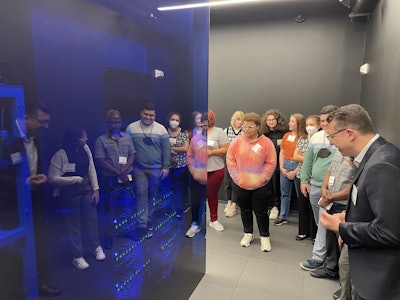 An inaugural cohort of students join quantum research labs around the Midwest through the Open Quantum InitiativeOpen Quantum Initiative
An inaugural cohort of students join quantum research labs around the Midwest through the Open Quantum InitiativeOpen Quantum Initiative
Through a 10-week residential research program called the Open Quantum Initiative (OQI) Undergraduate Fellowship, a dozen undergraduates from colleges and universities across the country will expand their understanding of QISE as well as connect with leaders in academia and industry.
“The more people of different backgrounds you have, the more ideas you have,” said Dr. Katherine Harmon, the Maria Goeppert Mayer Fellow at the U.S. Department of Energy’s Argonne National Laboratory and one of the early-career quantum researchers who helped bring this initiative to life. “And with new ideas coming in, you find new approaches to solve problems that I might not even be aware of. It benefits all of us.”
STEM fields, especially in computing and engineering, continue to suffer from a lack of racial, ethnic, and gender diversity. According to a recent Pew Research Center report, Black and Hispanic communities remain particularly underrepresented in the STEM workforce. Yet almost 70% of the OQI fellowship students identify as Hispanic, Latino, or Black. And nearly half are first-generation students. Women also make up half of the cohort.
“This will be my first formal opportunity to go deeper into quantum computing, which I’ve had an interest in for a while,” said Ariadna Fernandez, a senior and computer science major at the University of Illinois-Chicago (UIC) as well as one of the cohort members. “Because this field is so early, it can be hard to find these opportunities to explore it.”
Quantum science and engineering is still years away from full-scale commercial deployment. But it holds the potential to tackle big problems that were previously near-impossible to solve—and to do so quickly. Drug discovery could also become a lot faster and more precise. As this field takes off, researchers like Harmon are eager to make sure it is inclusive.
“Most of us in the cohort didn’t follow the traditional university roadmap,” said Fernandez, who spoke about how she transferred to UIC after going to a community college to save money. “We all had roadblocks along the way. Some of us, for example, took gap semesters in between community college and university for different reasons. And sometimes when you want to get into these fields like quantum computing, it can be hard to do that if you don’t follow specific pathways. I appreciate that we’re still given this great opportunity.”
Students will receive mentorship from researchers through the Chicago Quantum Exchange (CQE), which is based at the University of Chicago. The CQE network is anchored by the U.S. Department of Energy’s Argonne National Laboratory and Fermi National Accelerator Laboratory, the University of Illinois Urbana-Champaign, the University of Wisconsin-Madison, and Northwestern University.
Working with their mentors, students will complete a research project within a QISE group by the end of the program.
“That research experience in the program struck me because that can help students identify as scientists and engineers rather than passively receiving information from textbooks,” said Dr. Wendy Hill, Rappolt, Professor Emeritus of Neuroscience and the co-director of the Hanson Center for Inclusive STEM Education at Lafayette College. “They become do-ers in STEM. That helps them feel a sense of belonging. And there is a lot of research about how cohorts help to enhance that sense of belonging and inclusion.”
Hill referred to the Meyerhoff Scholars Program at the University of Maryland Baltimore County (UMBC) as a highly regarded national model of this cohort approach. For years, the Meyerhoff Program has consistently supported underrepresented students pursuing STEM research and careers. Much of that success hails from a focus on community.
“It’s about helping them understand the commitment we have to one another as a team," said Mitsue Wiggs, assistant director of the Meyerhoff Scholars Program. "If I got an A, but my peer got a C, then that was not a success, so how can I help my peer get that A? Another one of the cornerstones of Meyerhoff is high expectations. We let them know that it is a compliment that we think so highly of you. One of our mantras is that Meyerhoff is ten times the norm.”
To similarly foster a sense of community, the OQI cohort will stay connected after the summer ends. During the following academic year, fellows will have opportunities to meet virtually each month. Past fellows will additionally have the chance to mentor future fellows.
The OQI fellowship program for this summer is funded in part by the University of Chicago, Q-NEXT at Argonne National Laboratory, the Illinois Quantum Information Science and Technology Center at the University of Illinois Urbana-Champaign, HQAN at the University of Wisconsin-Madison, and The Ohio State University.
Rebecca Kelliher can be reached at [email protected].



















